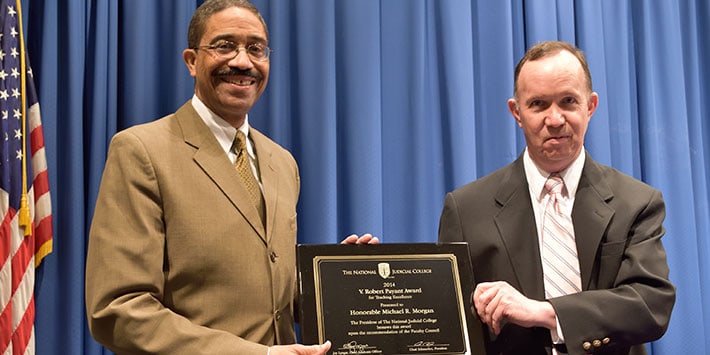

Judge Morgan has been teaching for the NJC since 1993, and received the 2014 V. Robert Payant Award for Teaching Excellence.
What is your legal/judicial background?
Upon obtaining a Bachelor of Arts Degree in both History and Sociology from Duke University in 1976, I earned a Doctor of Laws Degree with honors from North Carolina Central University School of Law in 1979. After a ten-year stint on the legal staff of the North Carolina Department of Justice from 1979 to 1989, I served for five years as a state administrative law judge with the North Carolina Office of Administrative Hearings. This judgeship ended upon my receipt of a gubernatorial appointment in 1994 to the trial court position of District Court Judge, in which I served for 10-½ years by virtue of two elections by popular vote. In 2004, I successfully ran for election to an open seat on the Superior Court trial bench. Upon re-election in 2012, I am currently in the midst of a second eight-year term as a Superior Court Judge.
In what NJC course do you teach? What subjects do you teach within that course?
The NJC course for which I teach is known as Administrative Law: Advanced. Within the course, I teach the subjects of Prehearing Practice, Alternate Dispute Resolution, Equal Access to Justice, Judicial Review and periodically, Courtroom Security. I join my esteemed faculty colleagues in the course to collectively instruct on the topics of Meeting the Needs of Self-Represented Litigants and Enhancing Justice through Achieving Impartiality.
Do you teach elsewhere? If so, where? What subjects do you teach there?
I frequently make accredited continuing education presentations for judges, lawyers, courthouse personnel and other legal system stakeholders.
What do you find to be the most challenging aspect of teaching judges at the NJC?
For me, the most challenging aspect of teaching judges at the NJC is the development and execution of a class presentation which is relevant for, applicable to and adaptable by all of the course participants. Thankfully, the College attracts a wide array of judges with diverse ranges of experience levels, jurisdictional authority, subject areas, judicial independence, institutional protocols, discretionary options and so forth. My NJC course routinely reflects this welcome diversity, which in turn makes each edition of the course not only challenging, but also unique and enlightening.
What aspect of teaching at the NJC do you enjoy most?
The aspect of teaching at the NJC which I most enjoy is the opportunity to present concepts, mechanisms and strategies to fellow judges which enable them to perform their duties more effectively and efficiently.
What do you find most rewarding about teaching at the NJC?
The ability to favorably impact the administration and delivery of justice is the most rewarding aspect for me as a teacher at The National Judicial College. Those of us who are fortunate to teach at the NJC are in a position to touch the lives of judges in an indelible fashion, as they come to the College expressly for the purpose of being equipped to become better facilitators and guarantors of the rendition of justice. In this regard, with these judges therefore presumably open to and expectant of the receipt of information to aid them to fulfill the obligation to be fair and impartial in their determinations, I treasure and appreciate the entrusted opportunity to influence the preservation and promotion of justice throughout this country’s communities via the many judges whom I’m privileged to teach.
What does The National Judicial College mean to you?
In my assessment, The National Judicial College represents a learning institution with an emphasis on a unique and effective blend of academic, intellectual, conceptual and practical studies and exercises adeptly designed to hone the skills of judges, while concomitantly enhancing their growth and development as decision makers, through informative interaction with knowledgeable instructors as well as their own peers, both inside and outside of the classroom environment.
Faculty Forum
News about and by NJC faculty members.

CHICAGO – The American Bar Association Judicial Division announced recently that TheNational Ju...

The National Judicial College is mourning the loss of former faculty member Judge Duane Harves, who passed ...

As the world manages an evolving natural environment, The National Judicial College announced today that it...

Do’s Manage your cases systematically Devise a system that works for you and your organizational...

After 22 years of teaching judges, Tennessee Senior Judge Don Ash will retire as a regular faculty member a...